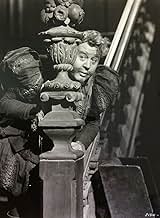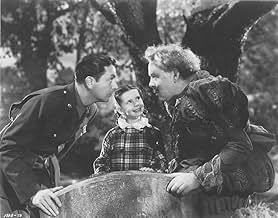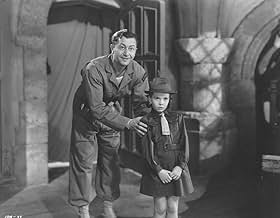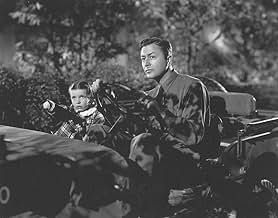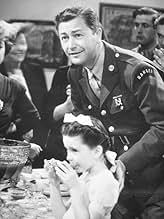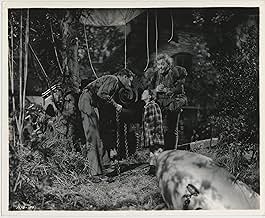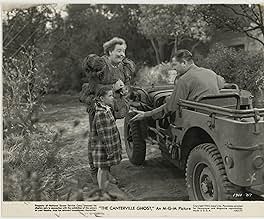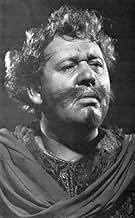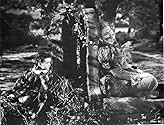IMDb RATING
6.9/10
3.6K
YOUR RATING
The descendent of a ghost imprisoned for cowardice hopes to free the spirit by displaying courage when under duress.The descendent of a ghost imprisoned for cowardice hopes to free the spirit by displaying courage when under duress.The descendent of a ghost imprisoned for cowardice hopes to free the spirit by displaying courage when under duress.
- Directors
- Writers
- Stars
- Awards
- 1 win total
Rags Ragland
- Big Harry
- (as 'Rags' Ragland)
Harry Allen
- Mr. Cawthorne at Party
- (uncredited)
- Directors
- Writers
- All cast & crew
- Production, box office & more at IMDbPro
6.93.5K
1
2
3
4
5
6
7
8
9
10
Featured reviews
delightful story of a tired ghost and his cowardly family
Margaret O'Brien tries to help one of her long-dead ancestors in "The Canterville Ghost," a 1944 film also starring Charles Laughton, Robert Young, and Frank Faylen. Jessica de Canterville's (O'Brien) family owns a castle which is being used to house soldiers during their stay in the area. The castle has a very famous ghost named Sir Simon de Canterville (Charles Laughton) whose father had him imprisoned inside a wall for cowardice centuries earlier. Simon roams the castle, looking like the Cowardly Lion in royal costume. The only way he can rest for eternity is if a relative performs a courageous act in his name, i.e., by taking his signet ring and wearing it when he does the brave thing. Alas, the entire family for centuries has run the other way when danger appears, so Simon isn't having any luck. When six-year-old Lady Jessica de Canterville realizes that one of the soldiers is related to her, she begs him to help poor, tired Simon.
This is a wonderful movie, buoyed by the presence of Margaret O'Brien, surely one of the most adorable children to ever hit the screen. She's a fine actress, too - very sincere and natural. Although Mary Astor wrote in her diary that she was terrified of O'Brian during the filming of "Meet Me in St. Louis," it's kind of hard to believe. Charles Laughton turns in another masterful performance as Simon, who scares people because he thinks that as a ghost, it's what he should do. He's a riot. As Cuffy Williams, the soldier related to Jessica and Simon, Robert Young is very good as a man who begins to doubt his own courage.
"The Canterville Ghost" is loads of fun for the entire family, with plenty of comedy and some nice lessons, one of which is, when you really want something, you often need patience until you achieve it.
This is a wonderful movie, buoyed by the presence of Margaret O'Brien, surely one of the most adorable children to ever hit the screen. She's a fine actress, too - very sincere and natural. Although Mary Astor wrote in her diary that she was terrified of O'Brian during the filming of "Meet Me in St. Louis," it's kind of hard to believe. Charles Laughton turns in another masterful performance as Simon, who scares people because he thinks that as a ghost, it's what he should do. He's a riot. As Cuffy Williams, the soldier related to Jessica and Simon, Robert Young is very good as a man who begins to doubt his own courage.
"The Canterville Ghost" is loads of fun for the entire family, with plenty of comedy and some nice lessons, one of which is, when you really want something, you often need patience until you achieve it.
Canterville's timid ghost
Charles Laughton who made a career of playing tortured and twisted men goes one better here as Sir Simon de Canterville who haunts stately Canterville Manor until another Canterville performs a heroic deed and frees him from being earthbound.
The first part of the film shows the incident where Sir Simon turns tail and runs from a duel he got involved in. Out of shame and embarrassment, his father bricked him up in a room in the manor and pronounced the aforementioned curse upon him.
Breaking that curse is easier said than done because the cowardice was passed down several generations from Stuart England to World War II.
Enter a platoon of American rangers quartered at the manor house where the current lady of the manor, Margaret O'Brien is like so many in Great Britain in those years, playing host to American GIs. One in that platoon is a distant cousin from America, Robert Young. Will he perform the deed that frees Charles Laughton? Watch the film and find out.
Robert Young and Margaret O'Brien are fine, but it is the multi-talented Mr. Laughton who carries this film. This is a difficult part and only an actor of real talent and skill could carry it off. The comic elements are nicely done, but Laughton also has to project an air of resigned sadness at the fate he's been cursed with. And Mr. Laughton bares the tortured soul of Simon de Canterville for all to see.
This is a story originally written by Oscar Wilde and nicely updated for World War II moviegoers. And it's still a fine piece of film making for today's audience.
The first part of the film shows the incident where Sir Simon turns tail and runs from a duel he got involved in. Out of shame and embarrassment, his father bricked him up in a room in the manor and pronounced the aforementioned curse upon him.
Breaking that curse is easier said than done because the cowardice was passed down several generations from Stuart England to World War II.
Enter a platoon of American rangers quartered at the manor house where the current lady of the manor, Margaret O'Brien is like so many in Great Britain in those years, playing host to American GIs. One in that platoon is a distant cousin from America, Robert Young. Will he perform the deed that frees Charles Laughton? Watch the film and find out.
Robert Young and Margaret O'Brien are fine, but it is the multi-talented Mr. Laughton who carries this film. This is a difficult part and only an actor of real talent and skill could carry it off. The comic elements are nicely done, but Laughton also has to project an air of resigned sadness at the fate he's been cursed with. And Mr. Laughton bares the tortured soul of Simon de Canterville for all to see.
This is a story originally written by Oscar Wilde and nicely updated for World War II moviegoers. And it's still a fine piece of film making for today's audience.
Smooth, leisurely-paced charmer...
Jules Dassin directed this adaptation of Oscar Wilde's story, a charming fantasy about the ghost of a coward haunting an English castle, aided by a relative who must perform a heroic deed to save the spirit from eternal misery. Despite a reportedly troubled production, the cast (including big scene-stealer Charles Laughton and little scene-stealer Margaret O'Brien) glides through it blithely, and Dassin's handling of the material is efficient, if perhaps a tad colorless. Robert Young and Peter Lawford are interchangeably bland, but there are some pleasurable moments. Perhaps not the most memorable apparition-laden comedy, but an enjoyable entry in the genre. **1/2 from ****
Safe and inoffensive fun.
Sir Simon of Canterville gets roped into fighting a duel for his cousin, realising he faces certain death he flees the field awash with cowardice. His father is so enraged as to this stain on the family honour - he walls Simon up in the castle without food and water until death does strike him down. He is doomed to haunt the Canterville castle until a fellow member of the family can commit an act of bravery and thus lift the cowardly stain that has besmirched the Canterville name.
Doesn't sound much like a comedy does it!, but it is, and a very amiable one at that. Loosely based on Oscar Wilde's story of the same name, The Canterville Ghost benefits from a couple of charming performances from Charles Laughton as Simon, and from a young Margaret O'Brien as Lady Jessica de Canterville. Laughton is clearly enjoying himself as the ghost, heavy on the "woe is me" theatrics coupled with gusto comedy, it's a very enjoyable performance from the big man. O'Brien is here enjoying being the center of attention and she positively lights up every scene she is in with youthful exuberance. The story follows a well trodden path to the rewarding ending, but it's a fun ride getting there regardless. Things really pick up a pace once a platoon of American soldiers are billeted at the castle and we are introduced to Cuffy Williams (Robert Young), a descendant Canterville of course, but he himself is showing a line in cowardice, so we are then left wondering if Cuffy can indeed show bravery and thus free Simon from his ghostly duties?. 7/10
Doesn't sound much like a comedy does it!, but it is, and a very amiable one at that. Loosely based on Oscar Wilde's story of the same name, The Canterville Ghost benefits from a couple of charming performances from Charles Laughton as Simon, and from a young Margaret O'Brien as Lady Jessica de Canterville. Laughton is clearly enjoying himself as the ghost, heavy on the "woe is me" theatrics coupled with gusto comedy, it's a very enjoyable performance from the big man. O'Brien is here enjoying being the center of attention and she positively lights up every scene she is in with youthful exuberance. The story follows a well trodden path to the rewarding ending, but it's a fun ride getting there regardless. Things really pick up a pace once a platoon of American soldiers are billeted at the castle and we are introduced to Cuffy Williams (Robert Young), a descendant Canterville of course, but he himself is showing a line in cowardice, so we are then left wondering if Cuffy can indeed show bravery and thus free Simon from his ghostly duties?. 7/10
lots of fun
Peter Lawford's part in the beginning of the movie was unusual in that he first seems to be an effeminate young fellow picking flowers rather than joining in with the manly deer hunt and then we find he has a lady in there with him, and not his lady. Conveniently, he says his sword arm is sliced to the bone, although it doesn't look all that bad, and he passes the duel on to his unfortunate kinsman who is later walled up by his father. When we learn that the entire family line was made up of cowards it puts a different complexion on everyone's actions and makes for an adult sort of kids' movie. (It seems that cowardice was either common in that region or the other party in the duel was some sort of relative, too.)
What we and O'Brien and Young's characters learn in this movie is that courage is mind over matter not genetics and that anyone old or young can be terrified but not everyone folds like a cheap card table, whether confronted by a ghost or the enemy. Young teaches it to O'Brien and she later has to remind him of it. That is good to keep in mind in any era but especially in wartime when frightening rumors could send people into hysterics rendering them not only useless but dangerous. If the poor ghost had, when alive, stood up to his relatives he could have avoided the dire events. Instead, he ended up cowering in a corner in shame and allowing himself to be bricked in. This story and the Wizard of Oz have a common theme--the way you perceive yourself alters your actions.
What we and O'Brien and Young's characters learn in this movie is that courage is mind over matter not genetics and that anyone old or young can be terrified but not everyone folds like a cheap card table, whether confronted by a ghost or the enemy. Young teaches it to O'Brien and she later has to remind him of it. That is good to keep in mind in any era but especially in wartime when frightening rumors could send people into hysterics rendering them not only useless but dangerous. If the poor ghost had, when alive, stood up to his relatives he could have avoided the dire events. Instead, he ended up cowering in a corner in shame and allowing himself to be bricked in. This story and the Wizard of Oz have a common theme--the way you perceive yourself alters your actions.
Did you know
- TriviaThe bomb that Cuffy and the ghost want to dispose of was known as a "blockbuster", so-called because it was so powerful it could demolish more than a dozen buildings i.e. a city block.
- GoofsWhile many German parachute mines with time delay dropped on England during World War II; but they weren't called blockbusters. The blockbuster was a type of bomb devised by the British. At first a blockbuster was a four thousand pound bomb; but later became an 8000 and then a 12000 pound bomb. They achieved these sizes by simply bolting two or three of the 4000 pounders together. They were called Blockbusters because it was calculated that they could destroy a city block.
- Quotes
Sir Simon de Canterville: Excuse me, I really must gibber at the oriole window.
- ConnectionsFeatured in Cineficción Radio: Lo fantástico (2020)
- SoundtracksBless 'em All
(uncredited)
Written by Fred Godfrey (1917)
Revised lyrics by Jimmy Hughes and Frank Lake (1940)
Additional lyrics by Al Stillman (1941)
Sung a cappella by the soldiers
- How long is The Canterville Ghost?Powered by Alexa
Details
- Release date
- Country of origin
- Language
- Also known as
- El fantasma de Canterville
- Filming locations
- Production company
- See more company credits at IMDbPro
- Runtime
- 1h 35m(95 min)
- Color
- Aspect ratio
- 1.37 : 1
Contribute to this page
Suggest an edit or add missing content



